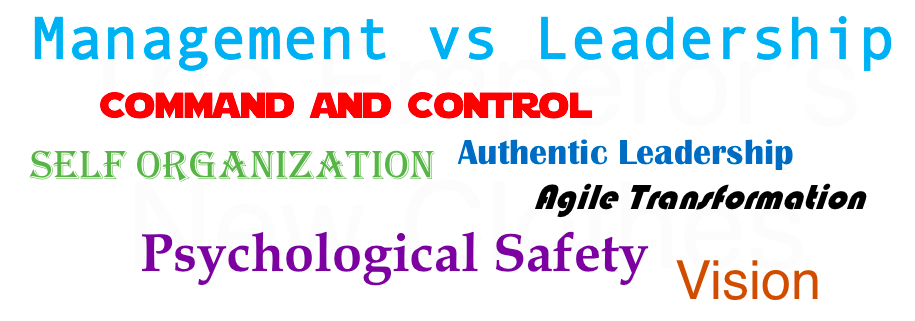
I’ve been wanting to write this series of articles for quite a while. In a world of agile transformations, straw man arguments about command and control and Taylorism, and self-organization being the answer to everything, I’ve been missing a balanced and realistic discussion about the role of management.
In the upcoming series of posts, I’ll dive a bit deeper into what I consider crucial management functions. They are crucial, because they need to happen. Sometimes they’re performed by informal leaders or (agile) coaches, and sometimes they’re not performed at all, which results in confusion at best or unhappiness and conflict at worst. Here’s the list. Managers should…
- Set the vision and identity for the team/department/company and maintain alignment
- Set “the box”; the boundaries for self-organization
- Produce results in meetings
- Spend time with their employees, offer feedback, and be ready to defend them
- Do the hiring
- Model desired behavior
Quite deliberately, I won’t make the distinction between “management” and “leadership”; I will use the words interchangeably. Also, I have no illusion of having discovered anything fresh or novel. Still, I want to put it in writing. One other caveat: List or no list, as a manager you have some administrative duties that you simply must perform. That said, it’s up to you whether you want to let them consume you or not.
What do I base the above list on? Here are my sources of inspiration:
University studies: I study behavioral science; psychology mostly, but also some sociology. Textbooks are a good source of foundation knowledge, and a good research article is a good research article. Still, academic research can be quite detached from what we experience in our daily work.
Reading consultant literature: I fell so tempted to mention a few titles, but I won’t. Consultant literature is characterized by catchy titles and covers, its anecdotal nature, and a natural commercial aspect where the author happily happens to provide a training based on his/her book. Still, there’s value in anecdotes too.
Working at Crisp. Now, this would be a series of posts in its own, but let’s just say that Crisp, where I have worked for almost a decade now, is an organization that wants to be different. Throughout the years we’ve ran quite a few experiments related to leadership and management (although we called it something else in most cases): some have had great outcomes, some absolutely horrible.
Going to leadership-ish trainings. I used to joke about being a leadership training junkie once upon a time. Like many consultants, I’ve been to quite a few trainings that claim to develop you as a person/manager/leader. Some have proven more useful than others, but given that you have the time and resources, you can always find some nuggets in every training.
Having been around for a while. My first decade in the industry was all about technology: “Wow! You’re doing Spring! On my last project, they were doing EJB 2!” and so on. Throughout the second decade, my thinking was more like: “Wow! This company’s CEO is a great motivational speaker. “ Or: “This company’s CTO does rally her troops every Friday, but then she only talks about herself for half an hour. “ Having seen quite a few organizations from the inside, I have gathered my share of war stories.
Having had some first-hand experience. I have my own experience from running a department. Not the biggest, to be frank, but big enough to let my dip my toe in being part of a management team, recruiting, developing a strategy and vision, working with other departments and so on. I’ve also worked as a team lead or scrum master from time to time.
Why have I listed the above? It’s not really about establishing bona fides. It’s more about listing the different angles from which I’m going to approach the topic. I also think it’s fair to list factors that may influence one’s biases.
Well, that’s that for part zero. Now part one needs to be written eventually…
